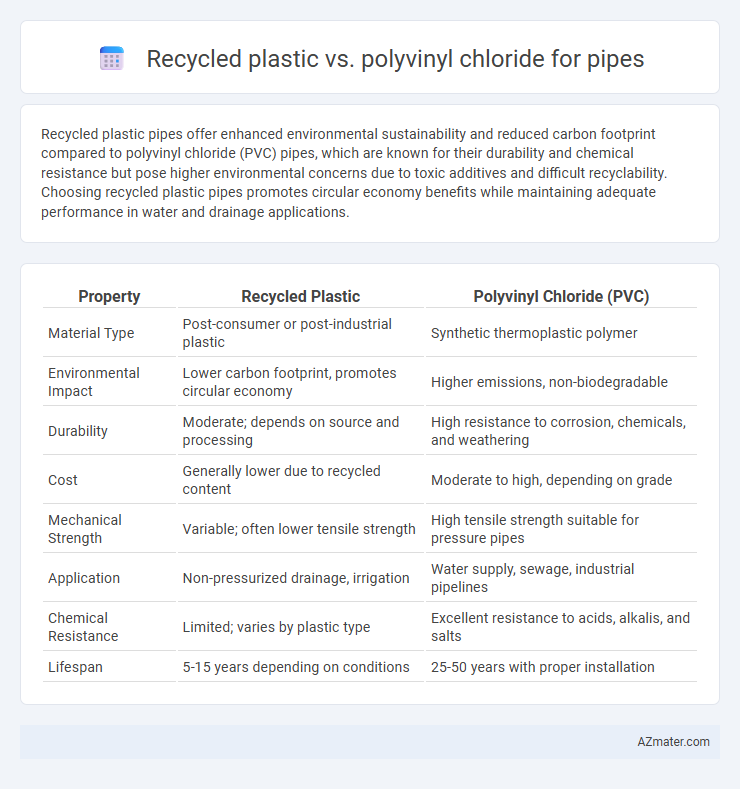Recycled plastic pipes offer enhanced environmental sustainability and reduced carbon footprint compared to polyvinyl chloride (PVC) pipes, which are known for their durability and chemical resistance but pose higher environmental concerns due to toxic additives and difficult recyclability. Choosing recycled plastic pipes promotes circular economy benefits while maintaining adequate performance in water and drainage applications.
Table of Comparison
| Property | Recycled Plastic | Polyvinyl Chloride (PVC) |
|---|---|---|
| Material Type | Post-consumer or post-industrial plastic | Synthetic thermoplastic polymer |
| Environmental Impact | Lower carbon footprint, promotes circular economy | Higher emissions, non-biodegradable |
| Durability | Moderate; depends on source and processing | High resistance to corrosion, chemicals, and weathering |
| Cost | Generally lower due to recycled content | Moderate to high, depending on grade |
| Mechanical Strength | Variable; often lower tensile strength | High tensile strength suitable for pressure pipes |
| Application | Non-pressurized drainage, irrigation | Water supply, sewage, industrial pipelines |
| Chemical Resistance | Limited; varies by plastic type | Excellent resistance to acids, alkalis, and salts |
| Lifespan | 5-15 years depending on conditions | 25-50 years with proper installation |
Introduction to Pipe Materials: Recycled Plastic vs PVC
Recycled plastic pipes offer an eco-friendly alternative to traditional polyvinyl chloride (PVC) pipes, reducing waste by repurposing post-consumer plastics. PVC pipes, known for their durability, chemical resistance, and low cost, dominate infrastructure and plumbing applications worldwide. Comparing their mechanical properties, environmental impact, and longevity highlights the growing importance of recycled plastic pipes in sustainable construction practices.
Environmental Impact of Recycled Plastic and PVC Pipes
Recycled plastic pipes significantly reduce environmental impact by diverting plastic waste from landfills and lowering carbon emissions during production compared to virgin materials. Polyvinyl chloride (PVC) pipes, while durable and widely used, involve energy-intensive manufacturing processes and release toxic chemicals like dioxins during production and disposal, contributing to pollution. Choosing recycled plastic pipes enhances sustainability by promoting circular economy practices and reducing hazardous waste associated with traditional PVC piping.
Manufacturing Processes: Recycled Plastic vs Polyvinyl Chloride
Recycled plastic pipes are manufactured through processes such as extrusion and injection molding using shredded or pelletized plastic waste, emphasizing energy efficiency and reduced raw material consumption. Polyvinyl chloride (PVC) pipes are produced primarily via extrusion of virgin PVC resin combined with stabilizers and plasticizers, offering precise control over pipe dimensions and mechanical properties. The recycled plastic process incorporates sorting and cleaning stages to ensure material quality, whereas PVC manufacturing demands stringent chemical formulation for durability and resistance to environmental factors.
Durability and Lifespan Comparison
Recycled plastic pipes demonstrate enhanced durability due to resistance against corrosion, chemical degradation, and UV exposure, contributing to a lifespan exceeding 50 years in optimal conditions. Polyvinyl chloride (PVC) pipes offer reliable mechanical strength and chemical resistance, typically lasting 25 to 40 years, but are prone to brittleness and cracking under prolonged UV exposure. The longevity of recycled plastic pipes often surpasses PVC, making them a sustainable and durable choice for long-term piping solutions.
Cost Analysis: Upfront and Long-Term Expenses
Recycled plastic pipes typically offer lower upfront costs compared to polyvinyl chloride (PVC) due to cheaper raw materials and manufacturing processes. However, PVC pipes often provide better long-term value because of their durability, resistance to corrosion, and lower maintenance expenses. Evaluating total cost of ownership requires comparing initial investment with lifespan, repair frequency, and environmental impact of both materials.
Chemical Resistance and Suitability for Applications
Recycled plastic pipes exhibit excellent chemical resistance against acids, alkalis, and salts, making them suitable for drainage and irrigation systems. Polyvinyl chloride (PVC) offers superior resistance to a broader range of chemicals, including solvents and strong acids, which makes it ideal for industrial piping and potable water systems. While recycled plastic is cost-effective and eco-friendly, PVC's durability and chemical resistance ensure long-term performance in demanding applications.
Installation, Maintenance, and Repair Considerations
Recycled plastic pipes typically offer easier installation due to their lightweight nature and flexibility compared to rigid polyvinyl chloride (PVC) pipes, which require precise cutting and solvent welding. Maintenance of recycled plastic pipes is often less intensive since they resist corrosion and chemical buildup better than PVC, which can degrade under UV exposure and harsh chemicals. Repairing recycled plastic pipes usually involves simple heat fusion or adhesive techniques, whereas PVC repairs demand replacing entire sections or applying complex fittings to address cracks or leaks.
Safety Concerns: Health and Regulatory Compliance
Recycled plastic pipes may pose health risks due to potential contaminants leaching harmful chemicals, whereas polyvinyl chloride (PVC) pipes have established safety standards and regulatory approvals for potable water use. PVC pipes comply with NSF/ANSI 61 certification, ensuring they meet strict limits on chemical leaching and thus maintain water quality safety. Regulatory agencies emphasize monitoring recycled plastics for consistent formulation and contaminant control to prevent exposure to toxic substances like phthalates and heavy metals.
Sustainability and Circular Economy Potential
Recycled plastic pipes demonstrate significant sustainability advantages by reducing waste and lowering carbon emissions compared to traditional polyvinyl chloride (PVC) pipes, which rely heavily on virgin fossil fuels and emit toxic chemicals during production and disposal. The use of recycled plastic supports a circular economy by diverting plastic waste from landfills and incineration, promoting resource efficiency and enabling multiple lifecycle uses through remanufacturing or repurposing. In contrast, PVC's limited recyclability and environmental persistence challenge circularity, making recycled plastics a more viable material for sustainable pipe manufacturing.
Future Trends and Innovations in Pipe Materials
Recycled plastic pipes are gaining traction due to their environmental benefits and enhanced durability through advanced composite formulations, making them increasingly viable alternatives to traditional polyvinyl chloride (PVC) pipes. Innovations such as bio-based additives, nanomaterial reinforcements, and improved recycling techniques are extending the lifecycle and performance of recycled plastic pipes in infrastructure and water management applications. Future trends emphasize sustainability, with research focusing on integrating circular economy principles and reducing carbon footprints in pipe manufacturing processes.

Infographic: Recycled plastic vs Polyvinyl chloride for Pipe
 azmater.com
azmater.com